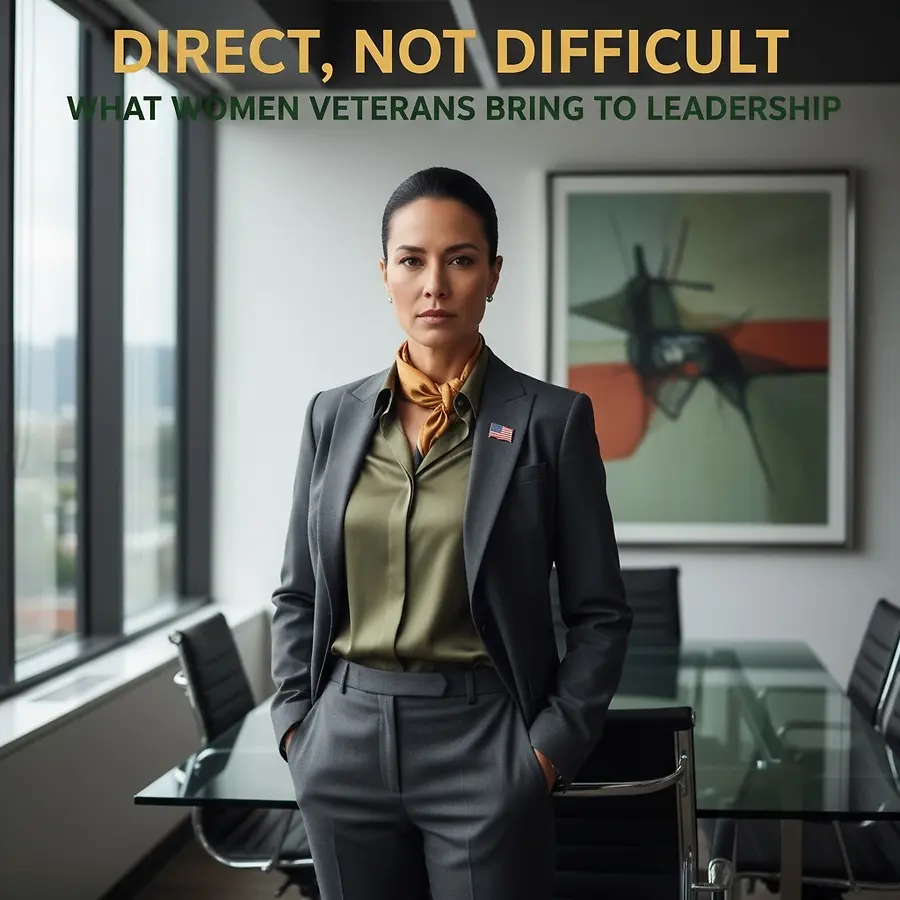Direct, Not Difficult: What Women Veterans Bring to Leadership
Why women veterans need mentorship—and how corporate America can unlock their leadership

Julie Muster Bryson
Veteran Advocate, Author, Business Owner, Founder & CEO
Boots 2 Benefits LLC

I read an article this week by Ryan Kuo about how America spends $14 billion annually training military leaders, only to largely ignore them when they transition to civilian life. Veteran representation in Fortune 500 CEO roles collapsed from 59% in 1980 to just 8% today—and has stayed there for over 15 years. But here's what the article didn't address: What happens when you're a woman veteran trying to navigate that gap? Let me tell you what happens. You get called aggressive. Intimidating. Difficult. A bi*ch. Not because you're any of those things—but because you're direct. And in corporate America, direct communication in a woman is often mistaken for hostility or bitterness.
The Box We're Placed In
The military taught me to communicate with clarity and precision. In the Army, you don't soften your message with qualifiers. You don't hedge. You don't apologize for taking up space or having an opinion. You are firm, direct, and quick.
You say: "Here's the situation. Here's the decision. Here's the action we're taking." That's not aggression. That's leadership.
But when female veterans bring that same communication style into civilian workplaces, we're often labeled as "too much." Too direct. Too assertive. Too... military. Ironically, the same traits that make male veterans attractive leadership candidates—decisiveness, confidence, clear communication—become liabilities when they come from women.
He's "a natural leader." She's "hard to work with."
He's "assertive." She's "aggressive."
He "commands respect." She's "intimidating."
It's the same leadership. Different lens.
The Double Standard in Action
Here's the paradox: The Department of Defense spends $14 billion a year on leadership training—for all ages, ranks, and types of military members. That's 14 times what Harvard Business School's entire annual budget. Corporate America says it wants strong leaders and invests millions in leadership development programs trying to teach people to be decisive, confident, and direct. But when women veterans show up—already trained, already tested, already proven—we're told we need to "soften our approach." Smile more. Be more collaborative. Tone it down. In other words: Be less like the leaders the taxpayers paid billions to create.
For decades, I've had to work intentionally on being "approachable" while maintaining authority—a balance male leaders rarely have to consciously navigate. My military bearing commands respect in professional settings, but I've learned that in civilian spaces, I have to modulate it or risk being dismissed as "too intense." That's exhausting. And it's a waste.
What We Actually Need: Mentorship, Not Judgment
Here's what most people miss: Women veterans don't need to be "fixed." We need to be mentored. The military taught us to lead in high-stakes, high-pressure environments. But it didn't teach us the unwritten rules of corporate culture. The politics. The "soft skills" that aren't soft at all—they're just different. We don't need to be told to "tone it down." We need mentors who can help us translate our leadership style into language that resonates in boardrooms and conference calls.
We don't need to be put in a box. We need advocates who recognize that directness is an asset, not a flaw—and who can help us navigate environments where perception matters as much as performance.The problem isn't our military leadership. It's the lens through which it's viewed as a woman.
The $14 Billion Question
America invests $14 billion annually in military leadership training—yet when 200,000 veterans transition out each year, many face the same question: "But do you have corporate experience?" For women veterans, there's often an unspoken follow-up: "And can you lead without being too... much?"
Here's what I want corporate America to understand:
You're not just missing out on talent. You're wasting a taxpayer-funded investment. You're ignoring leaders who've been tested in ways most corporate crises can't match. And you're doing it because you're uncomfortable with women who don't speak softly.
The Leadership Crisis Nobody's Solving
Corporate America claims there's a leadership shortage. Companies spend millions on development programs. MBA programs churn out graduates. And yet, the complaint persists: We can't find good leaders.Meanwhile, women veterans—trained, tested, and ready—are sitting on the sidelines because someone decided our leadership style "doesn't fit." $14 billion in leadership training is walking out the door every year. And corporate America is letting it go.
What I Did Instead
After 11 years in the Army and decades in government service, I didn't wait for corporate America to figure me out. I took that $14 billion leadership investment and put it to work—not in a Fortune 500 boardroom, but in service to the people who needed it most. This year, I founded Boots 2 Benefits LLC, a disabled veteran-owned business that helps fellow veterans navigate VA disability claims and veteran life. I wrote Operation FUBAR, which just hit #1 on Amazon's Hot New Releases. I launched the IGY6.2 (I Got Your Back Too) Movement, ensuring no veteran fights alone. And I did it by refusing to shrink.
The Path Forward
If corporate America truly wants to solve its leadership crisis, here's where to start:
1. Stop trying to put women veterans in a box.
Direct communication isn't a flaw. It's a feature.
2. Invest in mentorship, not "softening."
Help us translate military leadership into corporate language—don't ask us to abandon what makes us effective.
3. Recognize that "assertive" and "aggressive" aren't the same thing.
And stop using different words for the same behavior based on gender.
4. Leverage the investment you've already made.
$14 billion in leadership training is walking out the door every year. Use it.
The Bottom Line
I don't need corporate America to validate my leadership. I've already proven it—in uniform, in government, and now in business.But here's what bothers me: How many other women veterans are out there, being told they're "too much," when the real problem is that they're exactly enough—and that makes people uncomfortable? We didn't disappear. We're right here—running businesses, serving communities, and proving every day that the investment was worth it.The question isn't whether we can lead. It's whether corporate America is ready to harness the leadership it's already paid for.
I project confidence by knowing how much I've overcome in my life's journey. The Army taught me to lead with strength, but the Lord taught me humility—usually right when I needed it most. I've learned to balance both, using my confidence as a tool to serve others, not to intimidate them. In male-dominated fields like the military and veteran services, my military bearing commands respect without relying on intimidation. I've had to work intentionally on being approachable while maintaining authority—projecting the strength needed to lead while staying grounded in the humility that builds trust. Part of balancing confidence and humility in leadership is taking accountability, whether it's for successes or failures. Being honest with yourself and your team—owning both the wins and the mistakes—is what keeps that balance intact. True leadership isn't about being the toughest person in the room; it's about being strong enough to serve, humble enough to connect, and accountable enough to earn lasting trust.



